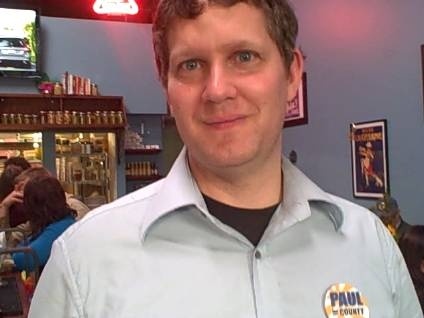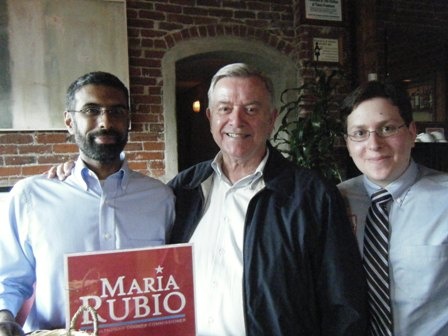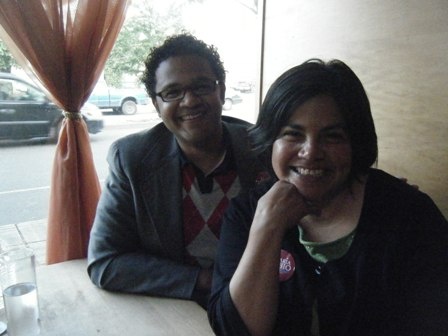
Even as hard-fought primary races came down to the wire last night, thoughts were turning to the hard times sure to be faced by anyone who makes it to local office after election day next Nov. 2.
Movers and shakers in the local community spent part of the time waiting for the elections returns by musing over the ways that the current economic downturn is short-circuiting everything from law enforcement to public services, development and the deli trays served at campaign parties.
Paul Van Orden
Unsuccessful Multnomah County candidate Paul Van Orden was eloquent about the racism that impacts day to day life for local residents.
"I think the biggest issue is the one that has recently come out in the press, and that is the disparity with the situation in Multnomah County relative to minorities," he said. "Someone is going to have to really find a way to develop a cohesive plan on how they are going to actually address the issue."
He named the Columbia River Crossing as a crucial civic project that will impact communities of color that is developing into an environmental justice problem.
 Others stuck with the economy as the baseline of political leadership in the next few years.
Others stuck with the economy as the baseline of political leadership in the next few years.
Sanjeev Balajee, Tom Potter and Dan Douthit
"The city is the same as the county is the same as the state," said former Portland mayor and chief of police Tom Potter, relaxing at County Commission candidate Maria C. Rubio's election-night function. "How do you choose the priorities you're going to fund?"
Potter said it is easy for candidates – and elected officials – to lose track of what the grassroots really needs, and that when disconnect harms public policy in measurable ways especially when it comes to equity, public safety and mental health services.
"That's why we've got to get more people of color into office, but we have to be smart about it," he said. "We have to find people who are really centered – often people are elected for the right reason but they are re-elected for the wrong reasons."

Jesse Beason, Serena Cruz
Also at Rubio's party, former County Commissioner Serena Cruz, who was hanging out with Proud Ground Director Jesse Beason (who used to be Mayor Sam Adams' senior policy director) commiserated over the eventual office-holder's burden.
Cruz argues that tough times require elected officials to have stronger connections with those they represent.
"I think it's recognizing how the district is affected deeply by the economy, and being able to communicate deeply with the community in the district," she said.
"I also think added to that is to raise the issue of a lack of resources," Beason said. "We passed a certain series of measures that put the county and other jurisdictions in a place where they are least able to meet the needs people have."
On a humorous note, alternative newspaper the Portland Mercury dispatched a full team of reporters on election night that fanned out across the city to note the popular mood, take down quotes from candidates, and closely analyze each campaign's party spread with an eye toward availability of free food and alcohol.

Sarah Mirk of The Portland Mercury, reporting from Northeast Portland
Reporters expressed anger at the cost of beer at Republican gubernatorial candidates Allen Alley and Chris Dudley's respective soirees, and disappointment with Democrats Bill Bradbury and John Kitzhaber's weak food offerings (Kitzhaber served mostly brownies, apparently).
The best food offerings, according to Mercury Editor in Chief Wm Steven Humphrey, was at Multnomah County candidate Ed Garren's party at a BBQ restaurant on Hayden Island. Nevetheless, Garren finished far out of the running for his chosen office.
Oregon Secretary of State Kate Brown announced late Wednesday that voter participation in the primary had jumped to 41 percent, higher than her projected 37 percent.
"Oregon easily exceeded the turnout in three states that had highly visible, contested primaries Tuesday for the U.S. Senate," said Don Hamilton, Brown's spokesman, in a statement. "The turnout in Kentucky was 33 percent; in Arkansas, 25 percent; and in Pennsylvania, 22 percent."














































































































































































































































































































